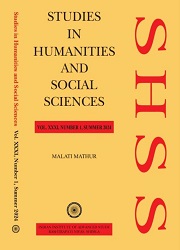Rethinking the Notion of ‘Secularism’ through the Idea of the Indian Philosophy of Ved'anta
Keywords:
State, Religion, Secularism, Brahman, Advaita VedantaAbstract
The generally accepted notion of secularism in India is that the State should respect and treat all religions equally. With regard to the historical context, secularism has emerged as a separate idea in the language of Western ‘modernity’, which envisions that the affairs of the state, and religion should be strictly kept apart. In India, religion has helped in the administration of the state since antiquity. After Independence, India followed Nehru’s understanding of secularism which was shaped by both Western as well as the narrow appeal of the liberal or Marxist ideas of secularism. It was post-1980s when the debate on the concept of secularism arose. Ashis Nandy wrote a radical critique of ideological secularism, titled ‘An Anti-Secularist Manifesto’ (1985) where he stressed the notion of religious tolerance, which was supported by the thoughts of T.N. Madan. This article tries to revisit the notion of secularism through the Indian Philosophy of Ved"anta, particularly Advaita Ved"anta which discusses the concept of oneness.



